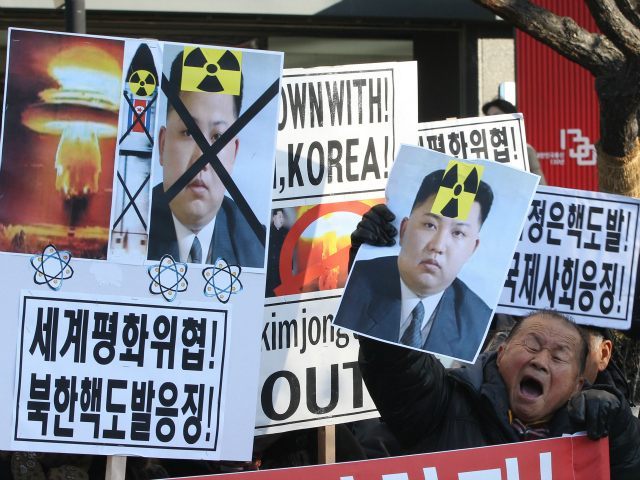The United Nations is vowing a “significant” response to North Korea’s claim that it successfully detonated a hydrogen bomb earlier this week, despite years of economic sanctions and arm sales bans doing little to deter the rogue nation’s aggressive behavior.
“The members of the Security Council will begin to work immediately on such measures in a new Security Council resolution,” Elbio Rosselli, the president of the Security Council and Uruguay ambassador, said Wednesday. Rosselli noted that the council had previously “expressed their determination to take ‘further significant measures'” on North Korea, but their work would have to be expedited in light of the new nuclear test.
In addition to Rosselli’s statement, UN Secretary Ban Ki-Moon issued a strident condemnation of the detonation. “This test once again violates numerous Security Council resolutions despite the united call by the international community to cease such activities. It is also a grave contravention of the international norm against nuclear testing,” he said, adding that the United Nations is “monitoring and assessing developments in close coordination with the concerned international organisations.”
The Security Council then held an emergency meeting Wednesday behind closed doors to assess the proper response to the North Korean provocation.
The United Nations has already taken four independent sanctioning actions against North Korea, all of which have been met with further nuclear development on the part of the rogue nation. The first resolutions were adopted in 2006 and 2009, and two more in 2013, blacklisting 12 North Korean individuals and banning arms trade with the country. They have had a minimal effect on North Korea’s military behavior.
Experts have suggested that whether a new round of sanctions will cripple the North Korean communist regime into more peaceful behavior will depend on whether they can continue to subsist on their trade with China, traditionally their most formidable ally. “All of this depends on the appetite of the council, particularly the Chinese position… There are more things we could do in terms of listing more people, brokers and intermediaries, broaden out the circle of people on the list,” a senior Western diplomat is quoted as saying in First Post.
“Very little economic interaction and trade exists between North Korea, the U.S, Europe or Japan, respectively — hence, the economic impact of past and new sanctions remains limited,” professor Sebastian Maslow of Tohoku University told USA Today, adding that North Korea’s economy may have improved since sanctions were imposed because it has more aggressively pursued trade with China.
China’s disposition towards North Korea’s detonation this week has been significantly more disapproving than in the past. Beijing summoned the North Korean ambassador on Wednesday to protest and issued a stern statement demanding Pyongyang cease its nuclear development entirely. “We strongly urge the North Korean side to remain committed to its commitment of denuclearization and stop taking any actions that will make the situation worse,” Foreign Ministry spokeswoman Hua Chunying told reporters, adding that China had no knowledge of the scheduled blast, causing panic in Chinese border communities who felt the 5.1 Richter scale blast.
On Thursday, Secretary of State John Kerry criticized the Chinese government for its previously lax attitude towards North Korean aggression. “China had a particular approach that it wanted to make, that we agreed and respected to give them space to implement that,” he said, “Today in my conversation with the Chinese I made it very clear that has not worked, and we cannot continue business as usual.”

COMMENTS
Please let us know if you're having issues with commenting.